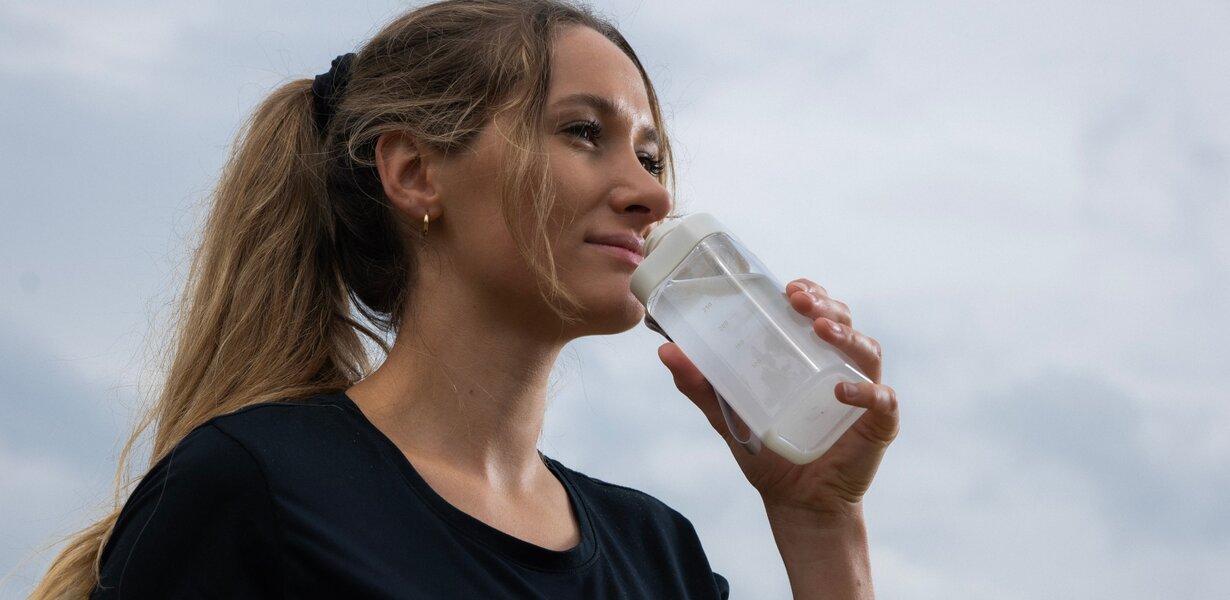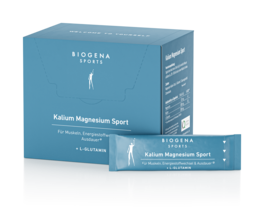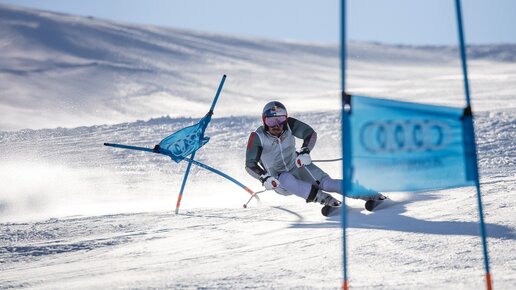‘You need to fill up your electrolyte reserves!’ ‘Have you drunk enough electrolytes?’ And: ‘That’s definitely because you don’t have enough electrolytes!’ Sooner or later, people who exercise will be confronted with these statements and questions. That’s because electrolytes are essential for your body – especially when you put it under strain. But what exactly are electrolytes? What are they good for? What happens if you don't have enough of them? Where are electrolytes found? And when should you take them – before or after exercise? We'll address these questions in this blog post, so that by the end you'll be an electrolyte pro. Let's go!
What are electrolytes?
Electrolytes. At first glance, this sounds like something to do with technology and electricity. But don't worry, you don't need to have taken a course in electrical engineering to understand what electrolytes are. It does get a little bit physical, though. And electricity also plays a role. But let's start at the beginning: Electrolytes are certain mineral salts. And their magic begins when they are dissolved in liquid. They then break down into positive and negative components. These charged particles are also called ions. They are charged because they can conduct electrical current.
Why does your body need electrolytes? Quite simply, they transmit important information from nerve cell to nerve cell. Without them, your organs and tissues would not be able to work together smoothly. Your nerves, muscles, fluid and energy balance are particularly dependent on them. And it's important to have the right balance. This is because both too low and too high electrolyte levels disrupt many processes in your body.
Effect & benefits: What do electrolytes do and what are electrolytes good for?
So who exactly belongs to this important species? The most important electrolytes include:
- Magnesium: This mineral is essential for your energy metabolism and for your muscles to function properly. Your heart, blood vessels, blood pressure and bones also need this substance.
- Calcium: This vital substance is very important for your skeleton. But you also need calcium for your muscles, nerves and healthy blood clotting.
- Potassium: 98% of this electrolyte is found in your cells. Your acid-base balance, nerves and muscles depend on it.
- Sodium: Sodium also plays an important role in your water and acid-base balance, with 90% of it located outside your cells. Your blood pressure and nerves can only function properly if they have access to sufficient sodium.
- Chloride: Another nutrient that ensures your water and acid-base balance and blood pressure remain stable. Chloride is also present in your stomach acid.
- Bicarbonate: Bicarbonate also contributes to your acid-base balance.
- Phosphate: Not quite as well known, but no less important, is phosphate. You need it for your skeleton and for building bones and teeth.
Electrolytes and sport: how the two are connected
Why should athletes in particular make sure they get enough electrolytes? You need to know that your electrolyte reserves are closely linked to your water balance. If your body loses a lot of water in a short period of time, your electrolyte balance will also be disrupted. All these valuable vital substances are then literally flushed out. One of the most common reasons for this is excessive sweating. And that can happen when you give your all during exercise.
But summer heat, an unbalanced diet, diarrhoea, vomiting, kidney disease, hormonal imbalances or certain medications, such as laxatives or diuretics, can also cause your body to lose too many electrolytes too quickly. Therefore, it's not just athletes who should keep an eye on their electrolytes, but also children, elderly people and people with a weakened immune system.
Electrolyte deficiency: symptoms you should take seriously
How does your body react to such a deficiency? It varies greatly, depending on which vital substance is most affected by this imbalance. The most common symptoms of electrolyte deficiency include:
- Circulatory problems, confusion and impaired consciousness
- Muscle weakness and cramps
- Headaches
- Exhaustion
- Cardiac arrhythmia
- High blood pressure
- Indigestion and nausea
However, many of these symptoms are non-specific and can also be associated with other health problems. To be sure whether you have an electrolyte deficiency – or an excess – you should therefore consult an expert and have a blood or urine test done.
How to remedy an electrolyte deficiency
So how can an electrolyte deficiency be remedied? The most important thing is to have the right nutrition:
- Drink enough: Water or unsweetened tea are best. Special electrolyte drinks that you can make yourself can also help. For example, mix one litre of mineral water with one teaspoon of salt, two tablespoons of sugar and 250 ml of orange juice. The sodium in the salt regulates your water balance, while the glucose in the sugar provides you with quick energy. And the potassium in the orange supports your muscle function.
- Pay attention to your diet: A balanced diet that provides you with plenty of electrolytes is key when you have an electrolyte deficiency.
- Use dietary supplements: In addition, you can support your body with supplements that contain exactly the electrolytes you need.
Where are electrolytes found: Which foods are in demand
The question that remains is: Which foods contain particularly high levels of these coveted vital substances? The following list provides an overview:
- Magnesium: wholemeal products, milk and dairy products, liver, poultry, fish, potatoes, legumes, soybeans, green leafy vegetables, berries, oranges, bananas, magnesium-rich mineral water
- Calcium: Milk and dairy products, broccoli, rocket, kale, calcium-enriched mineral water, tofu, hazelnuts, Brazil nuts
- Potassium: Apricots, carrots, bananas, avocados, kohlrabi, spinach, tomatoes, dried fruit, cashews, hazelnuts, peanuts, almonds, dark chocolate
- Sodium & chloride: Sodium chloride is table salt – but you shouldn't overdo it – the optimal amount is a maximum of 6 grams per day.
- Bicarbonate: Mineral water, medicinal spring water
- Phosphate: Meat, milk and dairy products, eggs, legumes
When should you take electrolytes – before or after exercise?
Before or after – that is the question. The answer: both are possible. This is because electrolytes can be taken both before and after exercise to provide the body with optimal support and promote recovery:
- Before training: Electrolytes stimulate your thirst and promote fluid intake, which creates a good basis for the upcoming exertion. You will also notice less electrolyte loss during training.
- After training: Once you have exhausted yourself, you can now replenish the minerals lost through sweating, reduce muscle cramps and thus help your body to recover.
Conclusion: Electrolytes – electric, practical, healthy!
Being under pressure. That's what we talk about when we're stressed, have too many tasks to do at once, and our brain goes on strike. And yes, such a state is not a good idea in the long run. But inside us, a weak electrical current is needed. Every second. Because that's the only way your nerves can pass on valuable information. Fundamental to this are electrolytes. Because without them, your body quickly starts to falter – it literally pulls the plug. When it comes to electrolytes, it's good to be on the ball and always supply your body with enough ‘juice’.
Frequently asked questions about electrolytes:
In cases of diarrhoea, sodium (salt), potassium (orange juice, bananas) and glucose (sugar) are particularly important for compensating for the electrolyte deficiency caused by fluid loss and preventing dehydration.
There is no general answer to the question of exactly how many electrolytes you should consume when you have diarrhoea. It is best to discuss this with a healthcare professional and, if in doubt, have a blood or urine test done. If you suffer from diarrhoea, you should focus on restoring your fluid balance, drink plenty of fluids and also add salt and sugar to compensate for the electrolyte deficit. Also make sure you eat a balanced diet – bananas, rice, tea and broth are particularly recommended.
As your electrolyte stores are closely linked to your water balance, an electrolyte imbalance or deficiency usually occurs when your body loses a lot of water in a short period of time. The most common reasons include: increased sweating (heat, exercise), an unbalanced diet, diarrhoea, vomiting, kidney disease, hormonal imbalances and certain medications (such as laxatives or diuretics).
An excess of electrolytes, on the other hand, is usually caused by an increased intake of these substances, for example through a diet that is too high in salt, excessive infusions or various illnesses.
Yes, an overdose is possible and just as bad as too few electrolytes. However, it also depends on the amount of water you consume – the more water you drink, the more electrolytes your body can tolerate. If this balance is not right, it can cause various symptoms, such as headaches or diarrhoea.
Drinking a lot of alcohol can disrupt your electrolyte balance, but such an imbalance is not always the main cause of symptoms such as fatigue, headaches, muscle pain, dizziness, vomiting or mood swings. Dehydration or oxidative stress can also cause these symptoms. Therefore, electrolyte drinks, for example, are usually only of limited help.
Yes, electrolytes are healthy because they are essential minerals that your body needs. It needs them for various functions and processes. They support your fluid and acid-base balance as well as your nerve and muscle function and ensure that you have enough energy.
Electrolytes should always be taken when the body is under severe strain and loses many of these important vital substances within a very short time. For example, during heavy sweating, diarrhoea, vomiting or after intense physical activity over a longer period of time.
An additional intake is also advisable if symptoms of electrolyte deficiency occur. These include muscle cramps, fatigue, dizziness or headaches. It is important to consult a medical professional, especially for older people, children or if the symptoms worsen.
As there are different electrolytes, different foods are recommended. Whole grain products, milk and dairy products, liver, poultry, fish, potatoes, legumes, soybeans, green leafy vegetables, berries, oranges, bananas and magnesium-rich mineral water are rich in magnesium. Calcium is found in milk and dairy products, broccoli, kale, rocket, calcium-enriched mineral water, tofu, hazelnuts and Brazil nuts. Apricots, carrots, bananas, avocados, kohlrabi, spinach, tomatoes, dried fruit, hazelnuts, cashews, peanuts, almonds and dark chocolate are rich in potassium. If you need sodium and chloride, you can find these in table salt. Good sources of bicarbonate are mineral water and medicinal spring water, while excellent sources of phosphate are meat, milk and dairy products, eggs and legumes.
Sources:
Whang R. Electrolyte & water metabolism in sports activities. Compr Ther. 1998 Jan;24(1):5-8. PMID: 9452894. https://pubmed.ncbi.nlm.nih.gov/9452894/
Shirreffs SM, Sawka MN. Fluid and electrolyte needs for training, competition, and recovery. J Sports Sci. 2011;29 Suppl 1:S39-46. doi: 10.1080/02640414.2011.614269. PMID: 22150427. https://pubmed.ncbi.nlm.nih.gov/22150427/
Abreu R, Oliveira CB, Costa JA, Brito J, Teixeira VH. Effects of dietary supplements on athletic performance in elite soccer players: a systematic review. J Int Soc Sports Nutr. 2023 Dec;20(1):2236060. doi: 10.1080/15502783.2023.2236060. PMID: 37462346; PMCID: PMC10355692. https://pubmed.ncbi.nlm.nih.gov/37462346/
Latzka WA, Montain SJ. Water and electrolyte requirements for exercise. Clin Sports Med. 1999 Jul;18(3):513-24. doi: 10.1016/s0278-5919(05)70165-4. PMID: 10410838. https://pubmed.ncbi.nlm.nih.gov/10410838/
Zieg J, Ghose S, Raina R. Electrolyte disorders related emergencies in children. BMC Nephrol. 2024 Aug 30;25(1):282. doi: 10.1186/s12882-024-03725-5. PMID: 39215244; PMCID: PMC11363364. https://pubmed.ncbi.nlm.nih.gov/39215244/
Poe J, Sriram S, Mehkri Y, Lucke-Wold B. Electrolyte Imbalance and Neurologic Injury. CNS Neurol Disord Drug Targets. 2024;23(7):841-851. doi: 10.2174/1871527322666230215144649. PMID: 36790006. https://pubmed.ncbi.nlm.nih.gov/36790006/
Braun EJ. Regulation of renal and lower gastrointestinal function: role in fluid and electrolyte balance. Comp Biochem Physiol A Mol Integr Physiol. 2003 Nov;136(3):499-505. doi: 10.1016/s1095-6433(03)00170-3. PMID: 14613780. https://pubmed.ncbi.nlm.nih.gov/14613780/
Katamadze NN, Pigarova EA, Dzeranova LK, Mokrysheva NG. [Features of water-electrolyte balance in persons of the older age group]. Probl Endokrinol (Mosk). 2024 Jan 24;69(6):28-36. Russian. doi: 10.14341/probl13214. PMID: 38311992; PMCID: PMC10848185. https://pubmed.ncbi.nlm.nih.gov/38311992/
Aperia A, Herin P. Electrolyte balance. Int J Technol Assess Health Care. 1991;7 Suppl 1:90-3. doi: 10.1017/s0266462300012575. PMID: 2037446. https://pubmed.ncbi.nlm.nih.gov/2037446/
Shimizu M. [Electrolyte solutions]. Kango. 1968 Oct;20(10):108-9. Japanese. PMID: 5190060. https://pubmed.ncbi.nlm.nih.gov/5190060/









